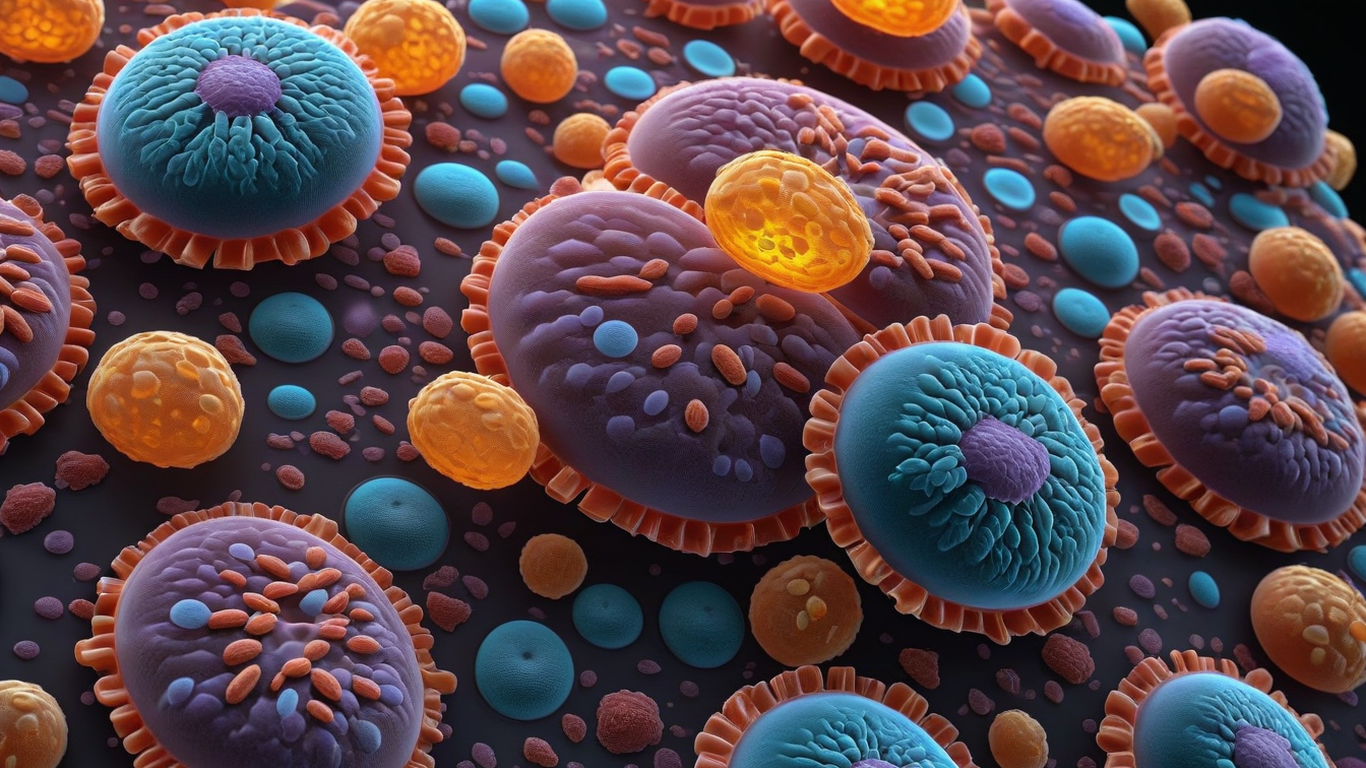- Introduction
- The Discovery of Zombie Cells
- Impact of Zombie Cells on Diabetes
- Innovative Treatment Approach
- Scientific Validation and Endorsements
- Challenges and Controversies
- Patient Testimonies and Case Studies
- Introduction of Sugar Defender
- Benefits of Sugar Defender
- Future Prospects and Research Directions
- Conclusion
- Frequently Asked Questions (FAQs)
- Transform Your Diabetes Care with Sugar Defender Today!
Introduction
Diabetes remains one of the most challenging chronic diseases worldwide, affecting millions of lives with its complex symptoms and severe long-term complications. Recent breakthroughs, however, may pave the way for revolutionary treatments. Among these, the discovery of “zombie cells” by researchers at the University of Dusseldorf represents a significant advancement in understanding the disease’s underlying mechanisms.
The Discovery of Zombie Cells
A dedicated team of cellular experts at the University of Dusseldorf embarked on an extensive study using advanced phase contrast microscopes to examine the pancreases of 260 diabetics. What they found was not just surprising but could very well change the course of diabetes treatment forever.
What are Zombie Cells?
Zombie cells, or senescent cells, are cells that have lost the ability to divide and die. Instead, they linger, secreting harmful chemicals that cause inflammation and damage to surrounding cells. Their presence in the pancreas disrupts the normal function of insulin-producing cells, leading to decreased insulin production and increased insulin resistance.
Findings from the University of Dusseldorf
The researchers discovered that these zombie cells accumulate in the pancreas, forming a toxic environment that stifles the organ’s ability to produce insulin effectively. This accumulation is now believed to play a crucial role in the progression of diabetes, challenging previous understandings of the disease.

Impact of Zombie Cells on Diabetes
The discovery of zombie cells within the pancreas sheds light on a potential underlying mechanism that exacerbates insulin resistance and reduces insulin production in individuals with diabetes. These cells’ impact on insulin production is multifaceted and significant.
How Zombie Cells Affect Insulin Production
Zombie cells, or senescent cells, are not merely dormant; they are actively harmful to the body’s tissues. In the context of diabetes, their presence in the pancreas is particularly detrimental due to their effects on the pancreatic islets, where insulin is produced.
Inflammatory Environment: Zombie cells secrete a variety of pro-inflammatory cytokines and other molecules that contribute to a chronic inflammatory state in the pancreas. This inflammation can damage insulin-producing beta cells, reducing the pancreas’s ability to produce sufficient insulin. The inflammatory cytokines can disrupt the signaling pathways necessary for insulin secretion, leading to decreased insulin release in response to blood glucose levels.
Beta Cell Dysfunction: The toxic environment created by the secretions of zombie cells can lead directly to beta cell dysfunction. Beta cells are particularly sensitive to increased oxidative stress and inflammation, which can lead to their premature aging and reduced functionality. This dysfunction not only diminishes insulin output but also affects the beta cells’ ability to proliferate in response to increased metabolic demands.
Fibrosis and Tissue Stiffening: Over time, the presence of zombie cells can contribute to fibrosis within the pancreatic tissue. This fibrosis, or thickening and scarring of tissue, can physically restrict beta cells and disrupt the normal architecture of the pancreas. As a result, the rigid, fibrotic tissue impedes the diffusion of nutrients and insulin, further lowering the efficiency of insulin production and secretion.
Insulin Secretion Impairment: Aside from reducing the number of functional beta cells, the cytokines and chemokines produced by zombie cells can impair the insulin secretion mechanism. This impairment means that even the surviving beta cells are less effective, compounding the problem of hyperglycemia (high blood sugar levels).
The cumulative effect of these factors is a significant reduction in the pancreas’s ability to produce and secrete insulin, leading to worsening glycemic control in diabetic patients. This insight into the role of zombie cells provides a clear explanation for why conventional diabetes treatments, which do not address this cellular senescence, may fail to fully control the disease over time.
Understanding and targeting the mechanisms by which zombie cells exacerbate insulin resistance and disrupt insulin production could revolutionize the approach to diabetes treatment, shifting the focus from managing symptoms to potentially curing the disease by rejuvenating pancreatic function.
Systemic Effects Beyond the Pancreas
Further studies suggest that the influence of zombie cells extends beyond the pancreas. They are implicated in various systemic effects across the body, contributing to complications commonly seen in diabetic patients such as cardiovascular disease, kidney failure, and even neurological conditions like Alzheimer’s disease.
Link to Other Chronic Diseases
The impact of zombie cells is not limited to diabetes; their presence is linked to a range of age-related diseases. This opens potential new avenues for treatments targeting these cells, offering hope not only to those with diabetes but also to individuals suffering from other chronic conditions.
Innovative Treatment Approach
The discovery of zombie cells’ role in diabetes has led to the development of a novel treatment approach that targets these cells directly. This method is not just about managing symptoms but aims to reverse the condition by addressing one of its root causes.
Overview of the Proposed Treatment
The proposed treatment involves activating specific components of the immune system to identify and eliminate zombie cells. By clearing these cells from the pancreas and other affected organs, the treatment hopes to restore normal insulin production and regulate blood sugar levels naturally.
Activation of the Immune System
A key part of the treatment is the enhancement of the body’s natural killer (NK) cells. These cells play a critical role in the immune response by targeting and destroying cells that are dysfunctional or infected. The treatment activates these cells to specifically target and eliminate zombie cells, potentially reversing the damage these cells have caused.
Role of Natural Ingredients
The treatment incorporates a blend of natural ingredients known to support immune function and combat cellular aging. Ingredients like Eleuthero, Astragalus, and Maca are used for their immune-boosting properties, while others like African Mango and Guarana help improve metabolic health. This combination not only aids in the fight against diabetes but also promotes overall health and wellness.
Scientific Validation and Endorsements
For a treatment of this magnitude, scientific validation is paramount. The claims made by the researchers have been backed by several prestigious institutions, which have conducted their own studies on the role of zombie cells in chronic diseases.
Support from Major Universities
Institutions such as Harvard, Cambridge, and Oxford have corroborated the findings from the University of Dusseldorf. These endorsements lend significant credibility to the treatment, highlighting its potential as a groundbreaking approach to diabetes care.
Clinical Trials and Their Outcomes
Preliminary clinical trials have shown promising results. More than 112,000 participants have reportedly benefited from the treatment, experiencing not only improved blood sugar levels but also better overall health. These trials are crucial in demonstrating the treatment’s efficacy and safety for broader use.

Challenges and Controversies
Despite the promising aspects of this new treatment, it has not been without its challenges and controversies, particularly regarding its reception by the pharmaceutical industry.
Suppression by Pharmaceutical Companies
Given the potential of this treatment to disrupt the existing diabetes medication market, some degree of resistance is perhaps expected. This suppression is alleged to involve pulling research funding and exerting influence to prevent the publication of study results.
Ethical and Regulatory Challenges
Bringing a new medical treatment to market involves navigating complex regulatory landscapes. Ethical considerations, particularly regarding how the treatment is marketed and its long-term implications, are also at the forefront of discussions.
Patient Testimonies and Case Studies
The introduction of any new treatment is often met with skepticism, but personal testimonies can provide compelling evidence of its effectiveness. Several individuals have reported significant improvements after using the treatment, shedding light on its potential benefits.
Personal Success Stories
Daniel Lopez and Tonya Barley are among those who have shared their experiences. Daniel, who was on the brink of severe diabetic complications, reported not only a reversal of his diabetes but also significant improvements in his overall health within months of starting the treatment. Tonya, from Birmingham, England, echoed similar sentiments, noting that her diabetes was reversed within seven weeks.
Impact on Quality of Life
Both patients highlighted not just the physical benefits of the treatment but also the profound impact on their quality of life. They reported increased energy, better mental clarity, and a reduction in the need for conventional diabetes medications.

Introduction of Sugar Defender
Built on the backbone of this groundbreaking research, Sugar Defender is a supplement designed to harness the potential of the immune system to combat zombie cells. It encapsulates the essence of the scientific discovery in a form that is accessible and easy to use.
Development and Composition of Sugar Defender
Sugar Defender was developed to provide a practical application of the research findings. It includes a blend of natural ingredients such as Eleuthero, Astragalus, Maca, African Mango, and Guarana, which are specifically chosen for their synergistic effects on enhancing immune function and promoting metabolic health.
How Sugar Defender Utilizes the Research Findings
The supplement is engineered to activate natural killer cells to target and eliminate zombie cells effectively. By doing so, it aims to restore the body’s natural ability to regulate blood sugar levels and improve pancreatic health.
Benefits of Sugar Defender
Sugar Defender offers several advantages over traditional diabetes treatments, which typically focus on symptom management rather than addressing the underlying causes.
Detailed Benefits and Mechanism of Action
By focusing on the removal of zombie cells, Sugar Defender helps to rejuvenate the pancreas and enhance insulin production. This approach not only helps in managing blood sugar levels but also reduces the incidence of common diabetic complications.
Comparison with Traditional Diabetes Treatments
Unlike conventional treatments that often require lifelong medication with potential side effects, Sugar Defender offers a more natural solution that targets the disease’s root cause. This could potentially reduce the long-term reliance on medications and their associated costs and side effects.
Future Prospects and Research Directions
The success of Sugar Defender opens new avenues for the treatment of diabetes and possibly other age-related diseases. Continued research is essential to fully understand the broader applications of this treatment.
Potential for Wider Application of Sugar Defender
Ongoing studies are exploring the possibility of using Sugar Defender in the treatment of other chronic conditions influenced by zombie cells, such as certain cancers and neurodegenerative diseases.
Ongoing and Future Research Needs
Further research is needed to optimize the formulation and delivery of Sugar Defender and to ensure its efficacy and safety in a broader population. Collaboration between researchers, clinicians, and patients will be crucial in advancing this promising field.

You can also view a detailed VIDEO explanation of the Zombie Cells by clicking here.
Conclusion
The discovery of zombie cells and the development of Sugar Defender represent significant advances in the fight against diabetes. This treatment approach not only offers hope for millions of patients worldwide but also highlights the importance of innovative research in uncovering new therapeutic strategies. As we move forward, it is crucial to continue supporting research and development in this area to ensure that these promising findings can be translated into widespread clinical practice.
Are you ready to take control of your health and combat diabetes in a groundbreaking way? Discover the power of Sugar Defender and see how our innovative approach can help rejuvenate your body’s natural insulin production. Visit our website now to learn more about how Sugar Defender works, read inspiring success stories, and order your supply today. Don’t wait to reclaim your health and transform your life!

Frequently Asked Questions (FAQs)
- What is Sugar Defender?
Sugar Defender is a dietary supplement developed based on the discovery of zombie cells’ role in diabetes. It aims to activate the immune system to target and eliminate these cells, thereby helping to reverse diabetes. - How does Sugar Defender work?
It works by enhancing the activity of natural killer cells, a type of immune cell that helps clear senescent or zombie cells from the pancreas and other organs, potentially restoring normal insulin production. - What are zombie cells?
Zombie cells, or senescent cells, are cells that have stopped dividing but do not die. They contribute to tissue damage and disease progression by secreting harmful substances. - Is Sugar Defender safe to use?
Sugar Defender is made from natural ingredients known for their safety and efficacy. However, as with any supplement, it is recommended to consult with a healthcare provider before starting any new treatment. - Can Sugar Defender cure diabetes?
Sugar Defender is designed to address one of the underlying causes of diabetes by targeting zombie cells. While it has shown promise in reversing diabetes in some cases, individual results may vary. - Who should use Sugar Defender?
Anyone suffering from type 2 diabetes or those at risk may consider using Sugar Defender. It’s also suitable for people looking to improve their overall metabolic health. - How long does it take to see results from Sugar Defender?
Some users report improvements in blood sugar levels and overall health within a few weeks, but results can vary based on individual health conditions and adherence to the recommended usage. - Are there any side effects of using Sugar Defender?
There are no known severe side effects due to its natural composition. Minor side effects may occur as your body adjusts to the supplement. - Where can I buy Sugar Defender?
Sugar Defender is available for purchase directly through their official website. Ensure you buy from official sources to guarantee the authenticity of the product. Click here to view website. - Does Sugar Defender replace my diabetes medication?
While Sugar Defender has been beneficial for some in managing diabetes, it should not replace medications prescribed by your doctor. Always discuss any changes to your medication regimen with a healthcare professional.
Transform Your Diabetes Care with Sugar Defender Today!
Are you prepared to revolutionize your approach to diabetes management? Experience the transformative effects of Sugar Defender. Our unique formula is designed to naturally enhance your body’s insulin production. Dive into the science behind Sugar Defender, explore compelling testimonials, and secure your own supply by visiting our website today. Take the first step towards a healthier, more vibrant life. Act now—your journey to wellness begins here! Click here to view the Sugar Defender website.












